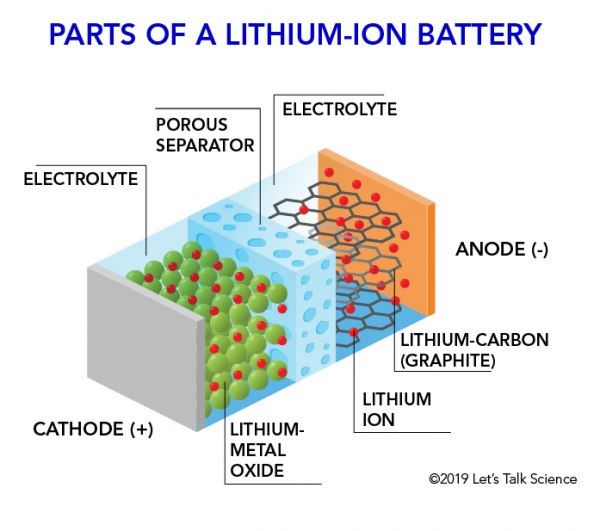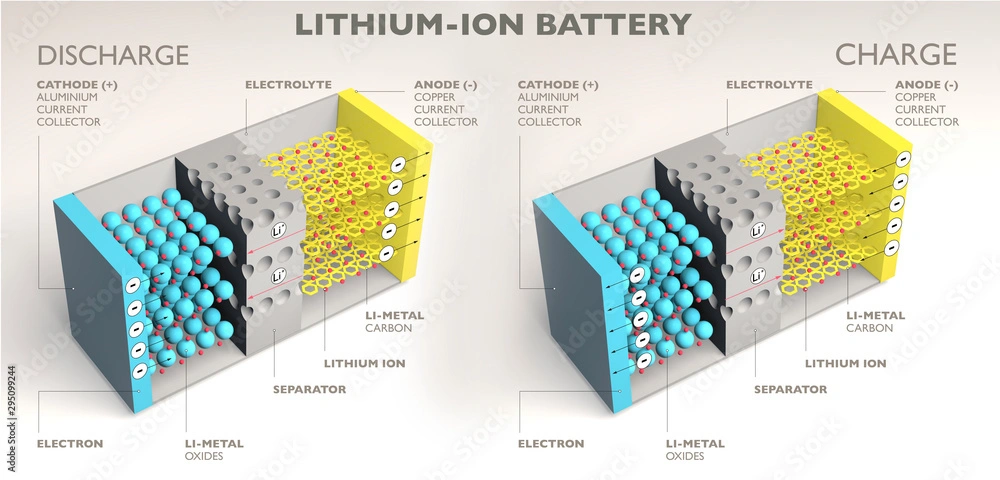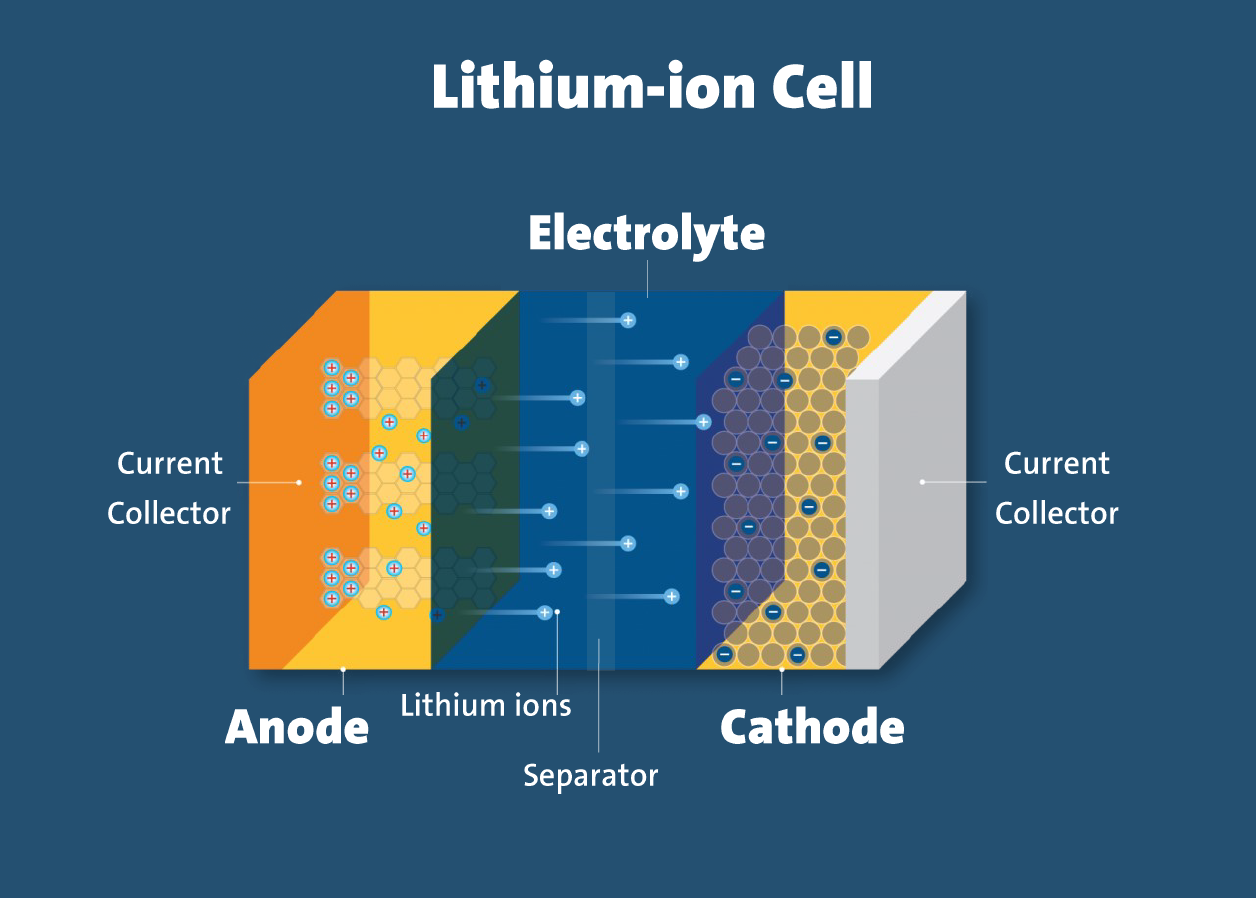A lithium-ion battery is a rechargeable battery commonly used today. It’s found in devices like phones, laptops, and electric cars.
Understanding lithium-ion batteries is crucial in our tech-driven world. They power many devices we rely on daily. These batteries offer high energy density, meaning they store a lot of power in a small space. Unlike older batteries, they charge quickly and last longer.
Their lightweight design makes them ideal for portable gadgets. The demand for lithium-ion batteries is increasing. They are essential in transitioning to renewable energy. As technology advances, they play a key role. Discovering their impact helps us appreciate their role in modern life. This blog will explore how they work and why they matter.

Credit: www.flashbattery.tech
Introduction To Lithium Ion Batteries
Lithium-ion batteries power the gadgets you use every day, from smartphones to electric cars. But have you ever wondered why they’re so popular? Understanding these batteries can help you appreciate the technology that fuels your daily life. Let’s dive into the fascinating world of lithium-ion batteries.
Origins And Development
The story of lithium-ion batteries started in the 1970s. Researchers were searching for a lightweight, rechargeable battery. During this time, they discovered lithium as a promising element due to its high energy density.
By the 1990s, Sony released the first commercial lithium-ion battery. This breakthrough changed electronics forever. The technology has evolved rapidly since then, becoming more efficient and safer.
Have you ever thought about how much work goes into the batteries in your devices? Innovations continue to improve their capacity and lifespan. This makes your devices more reliable and long-lasting.
Importance In Modern Technology
Today, lithium-ion batteries are crucial in powering portable devices. They make your smartphones, laptops, and tablets lightweight and efficient. Their ability to store a lot of energy in a small space is unmatched.
Electric vehicles are another area where these batteries shine. They provide the necessary power for long-range travel. This supports the shift towards sustainable transportation.
Imagine a world without lithium-ion batteries. It would be hard to enjoy the convenience of modern technology. They play a vital role in renewable energy systems, storing energy from sources like solar and wind.
As you can see, these batteries are more than just power sources. They are key enablers of technological advancement. What’s the next big thing they will power in your life?

Credit: letstalkscience.ca
How Lithium Ion Batteries Work
A lithium-ion battery powers many devices. It stores energy using lithium ions moving between a positive and a negative electrode. This movement creates an electrical charge, allowing the battery to power devices like phones and laptops efficiently.
Lithium-ion batteries power our modern world, from smartphones to electric cars. Their popularity stems from their efficiency and capacity to store energy. But have you ever wondered how they actually work? Let’s dive into the fascinating process that makes these batteries tick.
Basic Components
Understanding lithium-ion batteries begins with their basic components. Each battery consists of an anode, cathode, electrolyte, separator, and current collectors. The anode and cathode store lithium ions. The electrolyte facilitates the movement of ions between these two electrodes. The separator keeps the anode and cathode apart, preventing short circuits. Current collectors connect the battery to your device, allowing energy to flow.
Charge And Discharge Cycle
The charge and discharge cycle is at the heart of how lithium-ion batteries work. When you charge your device, lithium ions move from the cathode to the anode. This movement stores energy in the battery. When you use your device, the ions flow back to the cathode, releasing energy. Have you ever noticed your phone battery draining faster over time? This happens because every charge and discharge cycle slightly degrades the battery. Proper care, like avoiding extreme temperatures, can help extend its life. Lithium-ion technology might seem complex, but it’s all about movement and balance. How do you manage your device’s battery life? Are you mindful of charging habits? Understanding this cycle can help you maximize the lifespan of your battery and keep your devices powered longer.
Advantages Of Lithium Ion Batteries
Lithium ion batteries offer significant benefits. They are lightweight, have high energy density, and recharge quickly. Their long lifespan and low maintenance make them ideal for a range of applications, from electronics to electric vehicles.
Lithium-ion batteries have become a staple in our daily lives, powering everything from smartphones to electric vehicles. You might wonder why they’re so widely used and what makes them superior to other battery types. Let’s dive into the advantages of lithium-ion batteries and see why they stand out in the world of energy storage.
High Energy Density
Lithium-ion batteries are known for their high energy density. This means they can store a lot of energy in a small space. Think about your phone. It’s compact yet powerful enough to last all day on a single charge. This high energy density allows manufacturers to create lightweight devices without sacrificing performance. Have you ever felt the frustration of your laptop dying in the middle of a workday? Lithium-ion batteries help minimize such inconveniences because they offer more power for longer periods. As technology advances, the demand for more energy in smaller devices grows. Lithium-ion batteries rise to the occasion, meeting the needs of modern consumers like you.
Long Lifespan
Another significant advantage is the long lifespan of lithium-ion batteries. They can withstand hundreds of charge cycles before their capacity starts to degrade. This longevity means fewer replacements, saving you money and reducing electronic waste. Picture this: you’ve invested in a top-of-the-line electric bike. You expect it to last for years, right? Lithium-ion batteries ensure that your investment doesn’t quickly lose its value. They retain their charge capacity, keeping your bike running smoothly for many rides to come. Imagine the environmental impact if every device required frequent battery swaps. Lithium-ion batteries help mitigate this issue, making them a greener choice. The longer lifespan translates to less waste and fewer resources needed for new batteries. You can feel good about contributing to a more sustainable planet while enjoying reliable performance. Ask yourself: What do you value most in your electronic devices? If your answer is efficiency and longevity, lithium-ion batteries are a perfect fit for your needs. They keep up with your fast-paced lifestyle and support your eco-friendly choices.
Applications In Everyday Life
Lithium-ion batteries power everyday gadgets like smartphones and laptops. Known for their lightweight nature, they hold energy efficiently. Rechargeable lithium-ion cells are essential for portable electronics, making life more convenient and connected.
Lithium-ion batteries have become a cornerstone in our daily lives. They power devices and vehicles that we rely on every day. Their unique capabilities make them ideal for a wide range of applications. Let’s explore where you might encounter these powerful batteries in your day-to-day activities.
Consumer Electronics
Think about the last time your smartphone ran out of battery. You probably felt disconnected and a bit anxious. This illustrates how crucial lithium-ion batteries are to consumer electronics. They are lightweight, have a high energy density, and can be recharged many times. These batteries are in your smartphones, laptops, tablets, and even smartwatches. They ensure your devices remain portable and efficient. Imagine having to plug in your phone after just an hour of use. Not practical, right? Lithium-ion technology helps avoid this inconvenience, keeping your digital life seamless.
Electric Vehicles
Have you ever taken a ride in an electric vehicle (EV)? If so, you’ve experienced the quiet, smooth drive that lithium-ion batteries provide. They are the heart of EVs, storing the energy that powers the motor. These batteries have enabled the rise of electric cars, contributing to a greener planet. They offer longer ranges and faster charging times, making EVs a viable alternative to traditional cars. Picture yourself saving on fuel costs while reducing your carbon footprint. It’s a win-win situation. Lithium-ion batteries in EVs are not just about personal transport. They’re also used in electric buses and trucks, reshaping public and commercial transportation. This shift is not only transforming how we move but also how we think about energy and sustainability. In your daily life, lithium-ion batteries might be more integral than you realize. How do they impact you personally? Whether it’s staying connected or driving sustainably, these batteries play a pivotal role.
Challenges And Limitations
Lithium-ion batteries face issues like limited lifespan and safety concerns. They degrade over time, reducing efficiency. Thermal runaway can lead to overheating and fires, posing safety risks.
Lithium-ion batteries have revolutionized the way we store and use energy. Yet, like any technology, they come with their set of challenges and limitations. While they power everything from our smartphones to electric vehicles, understanding these drawbacks is crucial. Have you ever wondered why your phone gets hot when charging or what happens to old batteries? Let’s dive into some of these pressing issues.
Safety Concerns
Lithium-ion batteries can pose safety risks. Overheating is a common problem, which can lead to fires or explosions. This happens when the battery’s internal components fail, often due to damage or overcharging. Manufacturers are constantly working to improve safety features, but incidents still occur. Have you ever hesitated to leave your phone charging overnight? It’s a valid concern. Ensuring proper usage and handling can mitigate these risks.
Environmental Impact
These batteries have significant environmental implications. The extraction of lithium is resource-intensive, impacting local ecosystems and communities. Mining operations often lead to water shortages and land degradation. Additionally, disposal of lithium-ion batteries poses challenges. They contain toxic elements that require careful handling and recycling. Are you aware of where your old batteries end up? Consider recycling programs to reduce environmental harm. Understanding these challenges prompts us to think critically about our reliance on lithium-ion technology. What steps can you take to minimize risks and reduce environmental impact?

Credit: www.wtsenergy.com
Innovations And Future Trends
Lithium-ion batteries have transformed technology. Their impact on gadgets and vehicles is undeniable. But the journey doesn’t stop here. New innovations promise even greater advancements. These future trends are set to enhance efficiency and sustainability.
Solid-state Batteries
Solid-state batteries are gaining attention. They use a solid electrolyte instead of liquid. This change reduces the risk of leaks and fires. Solid-state batteries promise longer life and faster charging. They could transform electric vehicles and portable devices. Their compact size offers more design flexibility.
Recycling Technologies
Recycling technologies are crucial for sustainability. Used batteries often end up as waste. New methods aim to recycle lithium-ion batteries effectively. These techniques recover valuable materials. This reduces the need for new resources. Improved recycling lessens environmental impact and supports a circular economy.
Comparing Lithium Ion With Other Batteries
Lithium ion batteries have transformed how we store energy today. These batteries power our phones, laptops, and even cars. But how do they stack up against other battery types? Understanding these differences can help us make informed choices for our energy needs. Let’s delve into comparisons with lead acid and nickel metal hydride batteries.
Lithium Ion Vs. Lead Acid
Lithium ion batteries are lighter than lead acid batteries. This makes them ideal for portable devices. They also have a higher energy density. This means they can store more energy in a smaller space. Lead acid batteries, on the other hand, are bulkier. They often need more maintenance. Lithium ion batteries also charge faster. They can be charged and discharged more times. This gives them a longer lifespan.
Lithium Ion Vs. Nickel Metal Hydride
Nickel metal hydride (NiMH) batteries have been around for years. They are often used in power tools and hybrid cars. But lithium ion batteries have a higher energy density. This allows them to power devices for longer periods. NiMH batteries can lose charge over time when stored. Lithium ion batteries maintain their charge better. They also perform better in extreme temperatures. This makes them more reliable for various applications.
Conclusion And Future Outlook
Lithium-ion batteries power everyday devices like smartphones and laptops. Their growing importance shows potential for future technology innovations. Researchers aim to improve efficiency and safety, promising advancements in energy storage solutions.
As we wrap up our exploration of lithium-ion batteries, it’s crucial to look towards the future and understand what lies ahead for this pivotal technology. Lithium-ion batteries have already transformed the way we use energy, but their journey is far from over. With a growing demand and potential developments on the horizon, lithium-ion batteries are poised to play an even more significant role in our daily lives.
Growing Demand
The demand for lithium-ion batteries is skyrocketing. Electric vehicles are becoming more prevalent as countries push for greener transportation. You might have noticed more EVs on the road lately, reflecting a shift in consumer preferences. But it’s not just cars. Smartphones, laptops, and even power tools rely on lithium-ion technology. As these devices become more integrated into your life, the need for efficient and reliable batteries grows. Is the industry ready to meet this demand?
Potential Developments
Innovation in battery technology is relentless. Scientists and engineers are exploring ways to improve battery life, charging speeds, and safety. Imagine charging your phone in seconds or driving an EV that travels further on a single charge. There’s talk of solid-state batteries and other advancements that could revolutionize the industry. These developments could make lithium-ion batteries safer and more sustainable. Are these future technologies the game-changers we need? The future of lithium-ion batteries is promising, but the journey won’t be without challenges. As you rely more on these batteries, consider how advancements could impact your choices and lifestyle. Will the next generation of lithium-ion technology redefine your relationship with energy?
Frequently Asked Questions
What Is The Difference Between A Regular Battery And A Lithium Battery?
Regular batteries use alkaline or zinc-carbon chemistry. Lithium batteries offer higher energy density and longer lifespan. They perform better in extreme temperatures. Lithium batteries are lighter and recharge faster. Regular batteries are more affordable but provide less power. Choose lithium for high-performance devices and regular for low-cost applications.
What Is Lithium-ion Battery In Simple Words?
A lithium-ion battery stores energy using lithium ions moving between positive and negative electrodes. It powers devices like smartphones and laptops efficiently. Lightweight and rechargeable, these batteries have high energy density, making them ideal for portable electronics and electric vehicles.
They are widely used due to their long lifespan and quick charging capabilities.
Are Cell Phones Lithium Batteries?
Yes, most cell phones use lithium-ion batteries. They are popular due to their lightweight and high energy capacity. Lithium batteries provide efficient power, which supports longer phone usage. These batteries also recharge quickly, making them ideal for mobile devices. They are a crucial component in modern smartphones.
What Is The Biggest Disadvantage Of A Lithium-ion Battery?
The biggest disadvantage of lithium-ion batteries is their tendency to overheat, potentially causing fires or explosions. They have a limited lifespan and degrade over time, affecting performance. Disposal poses environmental challenges due to toxic components. Proper handling and storage are crucial for safety.
Conclusion
Lithium-ion batteries power many devices we use daily. They offer high energy density and are lightweight. These batteries have a long lifespan, making them cost-effective. They are also environmentally friendly when properly recycled. As technology advances, lithium-ion batteries continue improving.
We see them in phones, laptops, and even cars. Understanding their benefits helps us appreciate their role in modern life. With continued research, these batteries could become even more efficient. Consider their advantages for powering your devices. Embrace this technology as it evolves and becomes more prevalent in our world.
